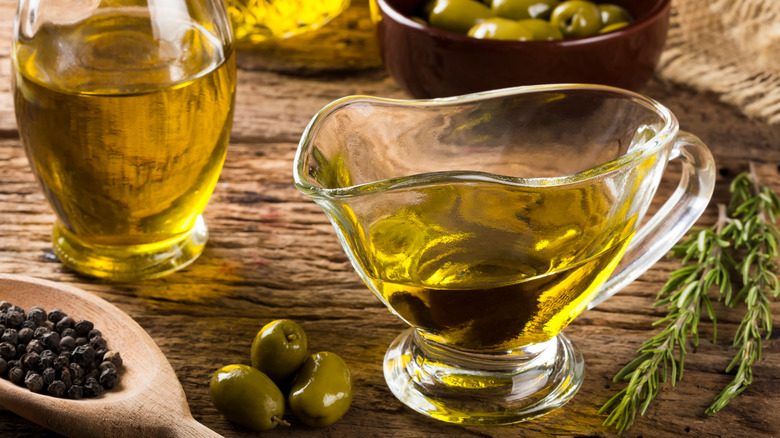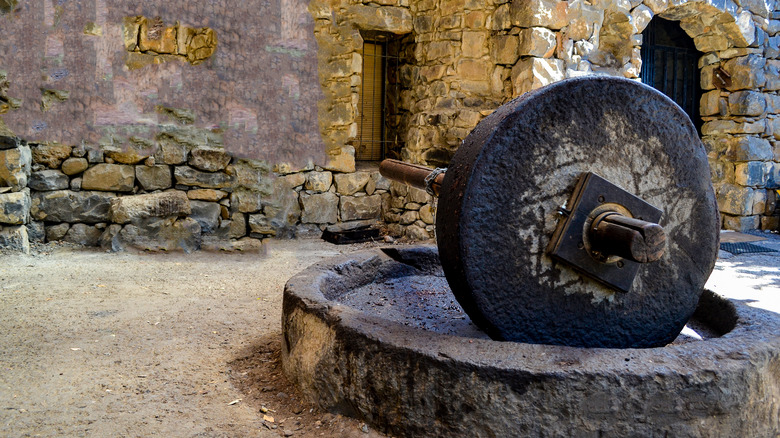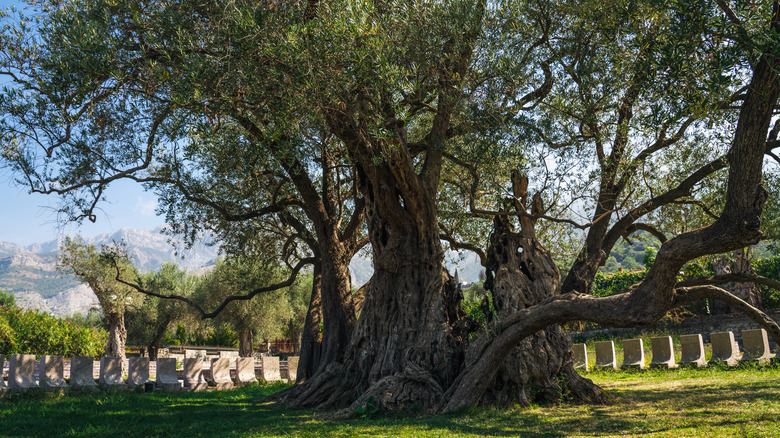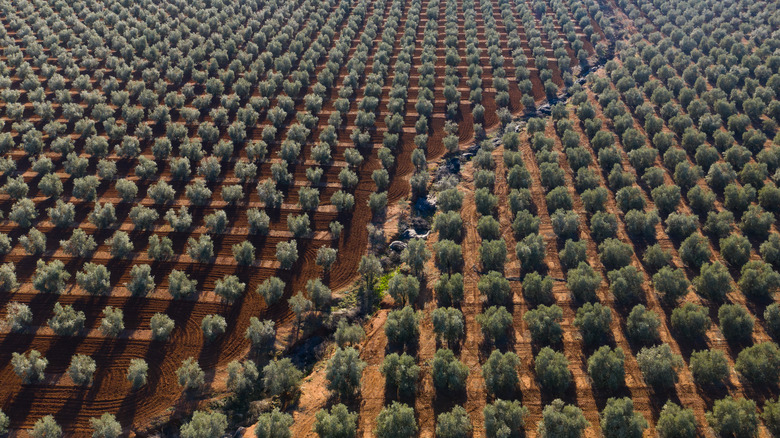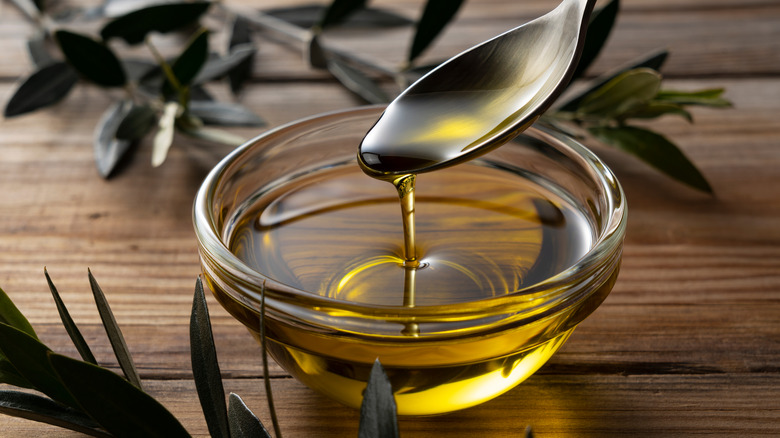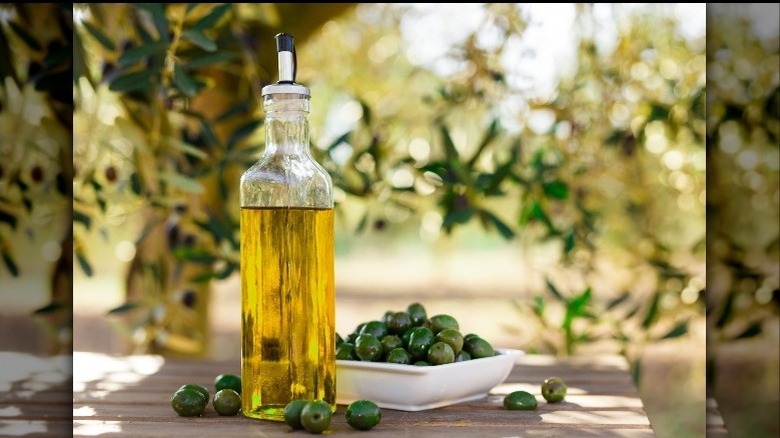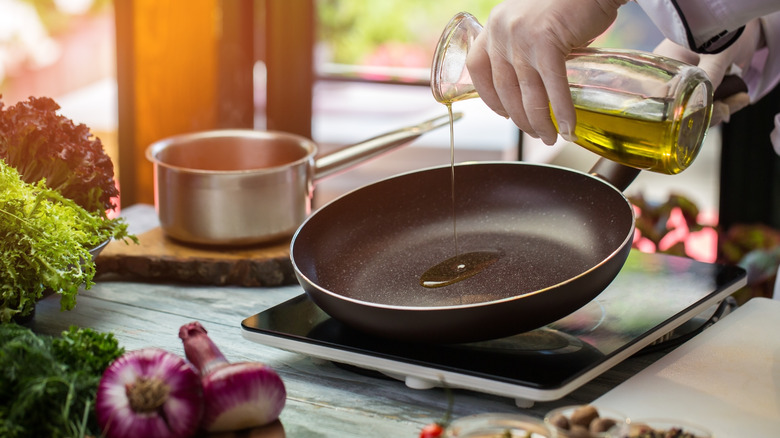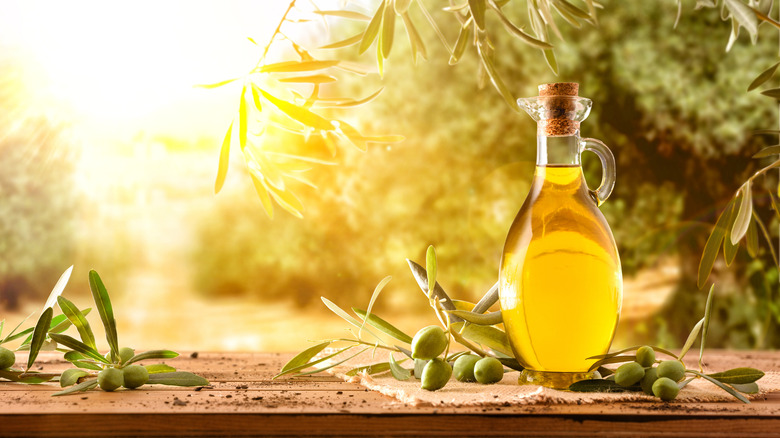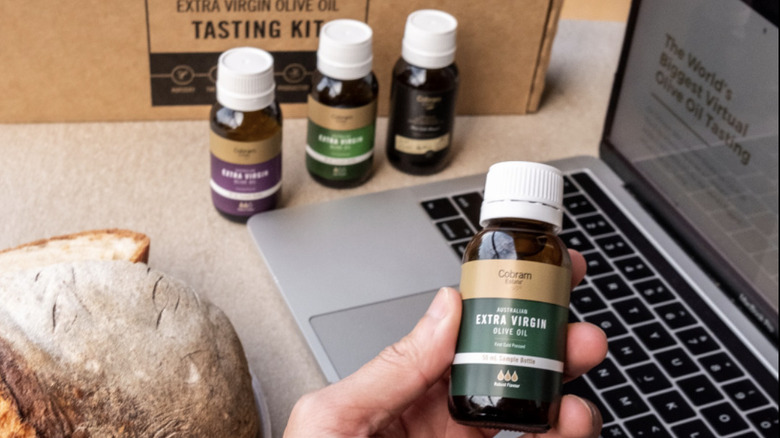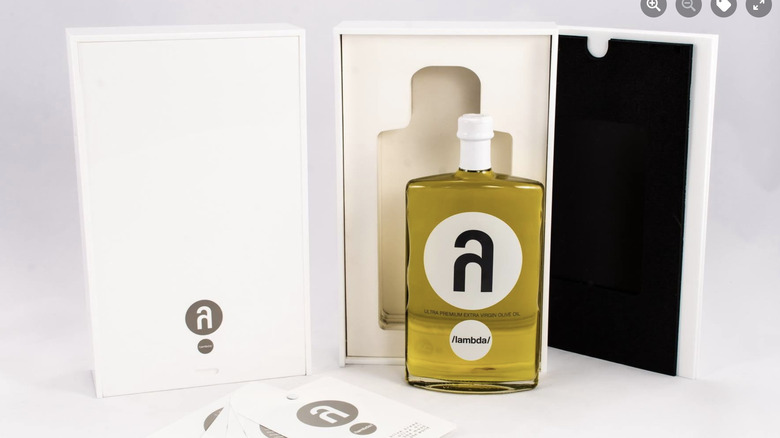The Untold Truth Of Olive Oil
Correction 5/6/22: A previous version of this article stated the majority of olive oil sold in the U.S. is fake. That claim has been refuted by industry experts, and other studies have shown the actual occurrence of mislabeled olive oil to be much lower than the original version of this article claimed.
According to Fortune Business Insights, the global olive oil market is projected to expand to $16.64 billion by 2027, a vast increase from $13.03 billion in 2019. And there are many great reasons why olive oil — and particularly extra virgin olive oil — is growing in popularity. For one, extra virgin olive oil is packed with antioxidants, polyphenols, and monounsaturated fats, which contribute to its high nutritional value (via Medical News Today). The culinary staple also makes a delicious addition to salads, fry-ups, and even baked goods.
Rich in flavor and health benefits, olive oil has been consumed for thousands of years (via OliveOil.com). In ancient times, olive oil was extracted by a process of crushing and kneading, and not all that much has changed over the years (via Colavita). Unlike canola oil or vegetable oil, extra virgin olive oil is still extracted without the use of high heat and chemicals. That said, extra virgin olive oil should be distinguished from other types of olive oil which undergo some levels of processing (via VeryWellFit). Keep reading to discover more about this delicious pantry staple.
Olive oil has a long history
Olive trees are believed to have been cultivated for olive oil production around the Mediterranean for thousands of years — it's likely that the practice originated in different locations at the same time (via OliveOil.com). Nevertheless, the earliest remains of olive oil found in Ein Zippori in Israel prove that the substance dates back 8,000 years. Another discovery confirming that ancient people were using olive oil around 6,500 years ago was made by Dr. Ehud Galili, who found crushed olive pits off the Carmel Coast near Haifa in Israel (via Haaretz).
According to Greek mythology, olive trees were created by the goddess Athena to persuade the Greeks to choose her, rather than the god Poseidon, as their patron. In fact, the substance was so revered in ancient times that Hippocrates referred to it as "the great healer" and Homer as "liquid gold" (via Science Direct). It's also alleged by Greek legends that the god Aristaeus brought olive oil to the Balkan Peninsula, the Aegean Sea, and the islands of Sardinia and Sicily. During the Roman Empire, olive oil became popular throughout the Mediterranean Basin, eventually reaching what is Spain today (via Olive Oils from Spain).
Olive trees can live thousands of years
Renowned for being able to thrive in the harshest of conditions, olive trees can live for thousands of years. In fact, one of the oldest trees in existence today is an olive tree named Al Badawi. Growing in the Al Walaja village in Bethlehem, the tree is estimated to be between 3,000 to 5,500 years old (via Atlas Obscura). The huge tree is around 39 feet high and 82 feet in diameter, making it about 10 times the size of an average olive tree (via Pali Roots).
While there's little doubt that Al Badawi is the granddaddy of olive trees, the one in your backyard could also easily outlive you. These majestic trees have an average life expectancy of between 300 and 500 years. That said, with suitable care and optimal growing conditions, an olive tree can live more than 1,000 years, Oliviada reports. While there are different varieties of olive trees, most only start producing fruit at five years, reaching full production by their eighth year (via Hunker).
Spain is the world's biggest producer of olive oil
According to The European Commission, the European Union produces 69% of the world's olive oil. Nine countries — Spain, Greece, Italy, Portugal, Malta, France, Croatia, Cyprus, and Slovenia — boast approximately five million hectares of olive groves. Over half of the EU's oil groves are found in Spain, making it the world's number one producer of olive oil. More specifically, Spain makes up almost 60% of the EU's olive oil production and 45% globally (via Juan Vilar). Around 75% of Spain's olives are grown in the south of the country in Andalusia, with 92% of olives used for oil extraction and 8% for table olives.
In the U.S., a great deal of the olive oil marketed as Italian actually comes from Spain, as per the Food Beast. This is confirmed by the fact that Italy sells more oil than it actually produces. According to the International Oil Council, Italy harvests around 300,000 tons of olive oil per year but retails 500,000 tons domestically and 330,000 tons internationally. Some of this surplus comes from Spain; in 2018, Spain exported 355,000 tons of its olive oil to Italy.
Greece is the world's leading olive oil consumer ... or is it?
Officially, Greeks are the biggest consumers of olive oil in the world, and the average resident guzzles around 20 liters of the stuff per year, according to About Olive Oil. Other olive oil-loving countries include Spain with a per capita consumption of 13 liters per year and Italy at 11 liters per person. To put this in perspective, the average American only consumes around one liter of olive oil per year. Despite this, the U.S. is still the largest consumer of olive oil in the small producer category (via Juan Vilar).
While the Greeks are definitely putting in the hard yards when it comes to olive oil consumption, there's a lesser-known country that is giving Greece a run for its money — San Marino. Surrounded by Italy, San Marino is one of the world's smallest countries, stretching some 23-square-miles. The country has around 35,000 inhabitants, most of whom seem to indulge in olive oil.
The Sammarinese consume about 24 liters of liquid gold per year, effectively beating Greece. Luigi Sartini, a chef at Ristorante Righi in San Marino told Olive Oil Times that the kitchen staple is used in most of the country's cooking, noting that "It is the heart of our tradition." He added, "Almost all of my recipes end up with an extra virgin olive oil finishing. Just like many other chefs in the area, I am an enthusiastic adopter and admirer of olive oil."
Olives are fruit but olive oil isn't a fruit juice
While you may be forgiven for thinking that olives are vegetables, they are actually a fruit. More specifically, Good Housekeeping explains that they belong to a category of fruit called drupes or stone fruit since they consist of a fleshy part enclosing a seed. This group of fruits also includes cherries, mangoes, peaches, dates, and plums. The outlet notes that green and black olives come from the same tree, but their color is dependent on the level of maturity of the fruit at harvest. They all start out green, darkening in color as they ripen.
Since olives are a fruit, you might think that olive oil is technically a fruit juice, however, this isn't actually the case. According to a definition by the U.S. Food & Drug Administration, juice is "the aqueous liquid expressed or extracted from one or more fruits or vegetables, purees of the edible portions of one or more fruits or vegetables, or any concentrates of such liquid or puree." Per OliveOil.com, olives don't produce fruit juice because the process of creating oil requires the removal of "aqueous liquid."
There are different grades of olive oil
Not all olive oil is created equal. The United States Department of Agriculture classifies olive oil into eight types, some of which are not suitable for human consumption: olive oil, virgin olive oil, extra virgin olive oil, lampante virgin olive oil, refined olive oil, pomace olive oil, refined olive-pomace oil, and crude olive-pomace oil. On supermarket shelves, however, you will usually only find extra virgin, pure, and light olive oil (via The Whole Portion).
While the International Olive Oil Council's charter of standards is the world's most commonly used grading system, Italica explains that the U.S. also has its own method of classification. Olive oil grading takes into account three main components. Firstly, the production method includes olive type and ripeness, environmental factors, harvesting, pressing techniques, and storage methods. Secondly, the acidity content is measured, and lastly, the olive oil's flavor and aroma are classified from poor to excellent. In terms of quality, extra virgin olive oil always comes out on top.
Extra virgin olive oil can withstand high frying temperatures
When using any kind of oil for frying, it's not advised to heat it over its smoke point — or the temperature at which the oil begins to break down. This is partly because burnt oil is likely to give the food an unpleasant taste, but also because it can release carcinogenic compounds such as aldehydes and lipid peroxides (via Healthline). According to Serious Eats, the smoke point of extra virgin olive oil stands at between 325 and 375 F, placing it lower than other oils such as sunflower (440 F) or canola (400 F).
According to a 2018 study published in Acta Scientific Nutritional Health, despite its fairly low smoke point, extra virgin olive oil is more stable than other oils when heated and produces less harmful polar compounds.
Extra virgin olive oil has numerous health benefits
There are many reasons why extra virgin olive oil is so popular with health-conscious people. In fact, some experts even recommend taking a shot of extra virgin olive oil in the morning as a digestive cleanser (via NDTV Food). Once extracted, extra virgin olive oil contains high levels of monounsaturated fats, polyphenols, and other beneficial micronutrients, as per OliveOil.com. The outlet explains that while standard olive oil is also healthy, it tends to contain only between 15% and 25% extra virgin olive oil and is usually submitted to heat and the addition of chemical compounds in production, reducing its health benefits.
So what are the benefits of the so-called liquid gold? For one, olive oil is great for cardiovascular health. According to a 2013 study of more than 7,000 adults in Spain, those who consumed a Mediterranean diet and four tablespoons of extra virgin olive oil per day reduced their risk of heart problems by 31% (via The New England Journal of Medicine).
Meanwhile, another study found that women who ate Mediterranean food supplemented with extra virgin olive decreased their risk of breast cancer (via JAMA Internal Medicine). The benefits are wide and extra virgin olive oil consumption has also been linked with better brain health and lower levels of depression, reduced inflammation, and increased immunity (via OliveOil.com).
Olive oil is great for baking
While this may not be common knowledge, olive oil makes a great baking alternative to other oils or butter. And this is not just because it's healthier — it can also add depth to the flavor of baked goods. According to Ellie Krieger at Fine Cooking, baked goods such as olive bread, biscotti, and Mediterranean fruit cakes have all traditionally been made with olive oil. However, you don't have to limit yourself and she emphasizes that it is particularly suitable for baked goods with nutty, fruity, or savory flavors.
In addition to being healthy and delicious, olive oil can improve the texture of baked goods. Adding it to cakes or brownies can provide a level of lightness and moisture that just can't be achieved with butter or other fats. This also means that incorporating olive oil into your baked goods can extend their shelf life, as they won't dry out as fast as those made with butter or other fats (via Saveur).
So what's the best way to make the transition to baking with olive oil? According to Fine Cooking, making the switch is as simple as substituting every quarter cup of melted butter for three tablespoons of olive oil.
Cobram Estate in Australia holds the Guinness World Record for the biggest virtual olive oil tasting
The Guinness World Record for the most viewers at an online olive oil tasting was awarded to an event that took place at the Cobram Estate in Australia in October 2021. Exactly 12,322 viewers watched the YouTube livestream with their special tasting kits. Olive oil specialist Leandro Martini Ravelli was in charge of leading the tasting of four Cobram Estate olive oils (via Guinness World Records). During the event, 10 participants won a year's supply of Cobram Estate Extra Virgin Olive Oil.
Meanwhile, the largest live olive oil tasting took place in Jaen in Spain in 2009. During the event, 12,909 people tasted Picual variety virgin olive oil (via Guinness World Records). It doesn't end there; two other olive oil-related records made it into the famous book. The world's largest collection of olive oil bottles — 2,440 to be exact — is owned by Ronald Popeil in Beverly Hills, California (via Guinness World Records). Meanwhile, Ashrita Furman from New York has been credited with eating the most olives in one minute — namely 60 — in 2012 (via Guinness World Records).
Lambda is said to be the most expensive olive oil in the world
The world's most expensive bottle of olive oil retails for $14,698. Called "Brilliant" by the LA Times and "The Chanel no 5 of olive oils" by the Worldguide, Lambda is handcrafted by Speiron in Greece. The Lambda Ultra Premium Extra Virgin Olive Oil gift set comes with a hand-crafted case with two engravable 18k gold plates (via Greek City Times). Those who can't afford to fork over thousands of dollars for olive oil can purchase a 500-milliliter bottle of the award-winning nectar for a mere € 70.00, or around $75 as of April 2022 (via Speiron).
So what makes Lambda's award-winning olive oil so unique? The Lambda Ultra Premium Extra Virgin Olive Oil is produced from selected Koroneiki and Maroneia olives that are handpicked and cold-pressed to elicit a medium fruity and pungent, slightly bitter taste with notes of artichoke, almonds, grass, and green tomatoes. The premium olive oil is well balanced and has a buttery aftertaste. The entire production process of each bottle of Lambda olive oil involves eight people and includes five quality controls (via Speiron).
Olive oil didn't become popular in the US until the '90s
While olive oil has been popular in the Mediterranean for thousands of years, the product didn't gain a footing in the U.S. until the '90s. According to Taste, olive oil didn't make its mark across the U.S. until politician and restaurant owner K. Dun Gifford decided to popularize the Mediterranean diet after a trip to Italy. Fast forward to the beginning of the millennium; the U.S. was importing 209,000 metric tons of olive oil per year, almost doubling the amount by 2019 (via Statista).
According to the North American Olive Oil Association, olive oil sales in the country increased by 25% in 2020 alone, with around 43% of households relying on the stuff. This sudden rise is thought to have been due to the fears associated with Covid-19. Faced with a pandemic, many consumers decided to take responsibility for their own health and this involved ditching less healthy oils in favor of olive oil.
There is a proper way to store olive oil
As much as we may hate the fact, olive oil deteriorates over time. While some olive oils have a harvest date printed on the bottle, others come with an expiration date. Usually, olive oil can sit on the shelf for two years following harvest as long as it is not open, olive oil sommelier Katerina Mountanos tells Taste of Home. The outlet recommends storing an open bottle between three and six months to retain its freshness.
In addition, exposing olive oil to heat, oxygen, and light should be avoided. As such it's important to store it away from sunlight — a dark cupboard is ideal. And while it may seem handy, olive oil should never be stored near the stove where it gets hot. In fact, Kitchn reports that the ideal temperature for storing olive oil is 57 F, just below room temperature.
Another trick for keeping olive oil fresh is to pour it into an opaque bottle or a stainless steel container; never store it in plastic or reactive metals such as iron or copper. Last but not least, always remember to keep your olive oil in a closed container to keep it away from oxygen (via Kitchn).
